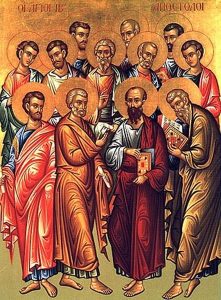Thoughts on Sunday’s Lessons for Oct. 17, 2021
First Reading (Track One): Job 38:1-7,34-41
If you want to be in charge of everything, be careful. This theme recurs in various forms in Sunday’s readings.

James and John stand on either side of Jesus in this Orthodox icon of Jesus and the apostles. (Click image to enlarge.)
In our Track One first reading, Job has been loudly lamenting his condition and looking everywhere for God, angrily demanding that God come out of hiding and hear him. Now Job gets his wish. God speaks to him out of a whirlwind in power and might, and quickly sets Job in his place. God hurls poetic words at Job like thunderbolts: “Where were you when I laid the foundation of the earth? Tell me, if you have understanding.” There is no promise that chaos and disaster will not occur in wind and flood and starvation; but nothing in creation is greater than its Creator.
First Reading (Track Two): Isaiah 53:4-12
Throughout Sunday’s readings we hear of servant leadership, sacrifice, and walking humbly with our God. Isaiah’s “Suffering Servant,” whom we meet often in our readings (most recently just one month ago), may make us think of Jesus in his willing sacrifice to bear the sins of many. In its original context, though, Isaiah writes of the servant’s suffering in the past tense, remembering Israel itself as the servant, the sacrificial pain of its sad exile now finally come to an end.
Psalm (Track One): Psalm 104:1-9,35, 37c
Echoing God’s extended response to Job, this hymn of exaltation worships God as creator of the universe and as ruler of all creation, whose mighty works fill us with awe. The Psalmist portrays God clothed in majesty and splendor. God rides across the world on the wings of clouds, spreading out mountains and valleys, oceans and rivers; setting the earth immovably on its foundations and separating the land from the water.
Psalm (Track Two): Psalm 91:9-16
We hear only the second half of Psalm 91 today. Take a moment, though, to look up the preceding verses in the Psalter (Pages 719-20, BCP). There we learn of another servant who suffered, yet who received God’s protection against illness and enemies. In the verses we read on Sunday, the Psalmist assures us that we gain protection by seeking refuge in God. Then, in a form quite unusual for the Psalms, God speaks directly in the first person, assuring the servant of God’s protection, honor and salvation.
Second Reading: Hebrews 5:1-10
Hebrews, more akin to a published sermon than a traditional letter, is historically understood as an effort to persuade first century Jewish Christians who had returned to Judaism under persecution to come back to the way of Christ. To that end, it presents Jesus as the new high priest, one who brings a new covenant and new sacrifice in the aftermath of the destruction of the Temple. Jesus, fully human, suffered “with loud cries and tears,” it tells us. Learning obedience through suffering, Jesus became the greatest of the line of priests that began with King Melchizedek, the first high priest named in Genesis. As the perfect image of God, Christ earned salvation for us all.
Gospel: Mark 10:35-45
In the verses just before these, Jesus told the apostles for the third time, in more detail than ever, that when they reach Jerusalem he will be arrested, flogged, killed, and will rise again. And now, also for the third time, some of them respond with remarkable cluelessness. Showing how little they have learned, James and John (“the Sons of Thunder”) don’t ask but tell Jesus that they want to sit at his side in God’s kingdom. Jesus has news for them: To follow Jesus we must be servants, not those served; if we wish to be first, we must be the slave of all.
